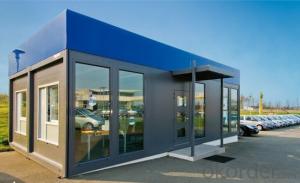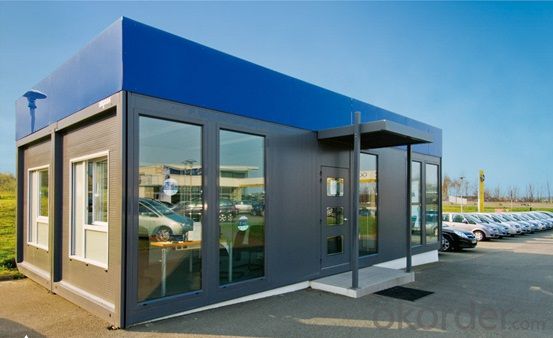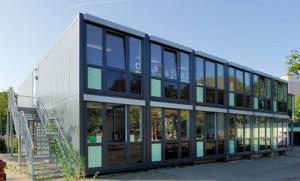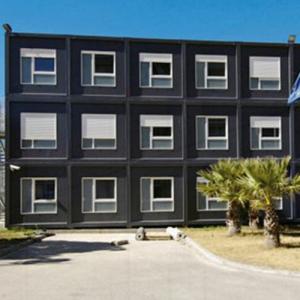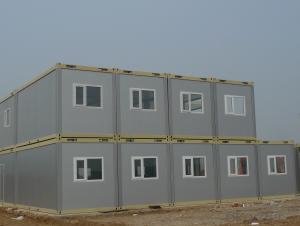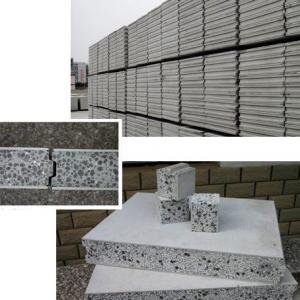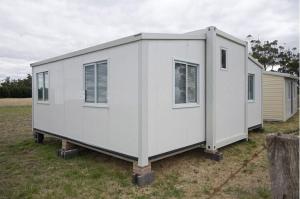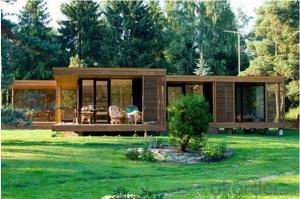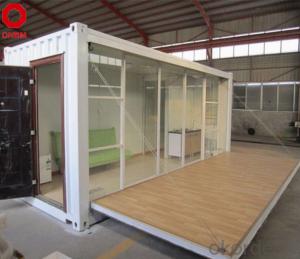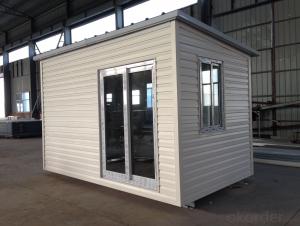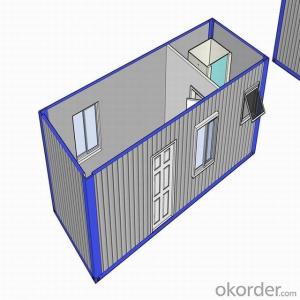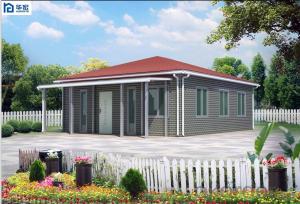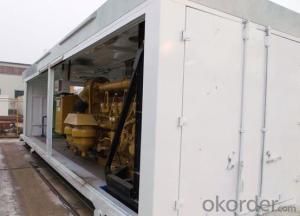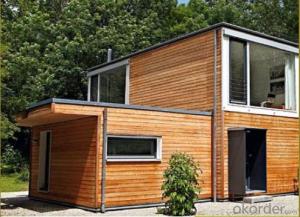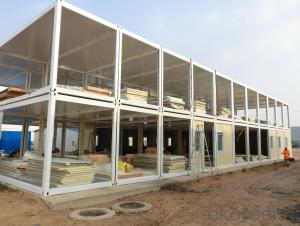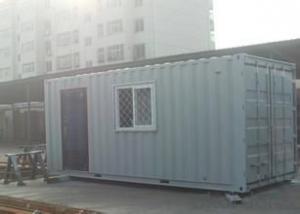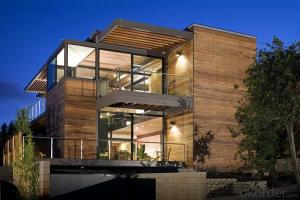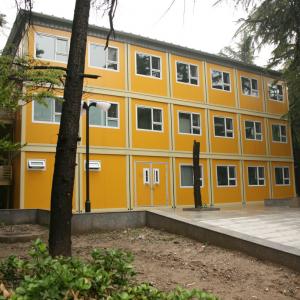Popular container house
- Loading Port:
- China Main Port
- Payment Terms:
- TT OR LC
- Min Order Qty:
- -
- Supply Capability:
- -
OKorder Service Pledge
OKorder Financial Service
You Might Also Like
Product:
20ft Container House,Movable House,Prefab House,Mobile House,Modular House,Low-cost Office,Toilet,Shower
Specification: 5910*2438*2591mm
No. | Part Name | Material |
1 | Foundation | Square Tube |
2 | Corner Post | Steel |
3 | Floor Beam | C Shape Steel |
4 | Roof Beam | C Shape Steel |
5 | Connection Plate | Steel |
6 | Edge Covering | Steel Plate |
7 | Wall | Sandwich Panel, optional |
8 | Flooring | Plywood+Vinyl Flooring/Laminate Flooring, optional |
9 | Roof | Corrugated Sandwich Panel, optional |
10 | Door | Sandwich Panel with aluminum doorframe |
11 | Doorlock | Stainless Steel |
12 | Window | Plastic Steel or Aluminum |
Plan:
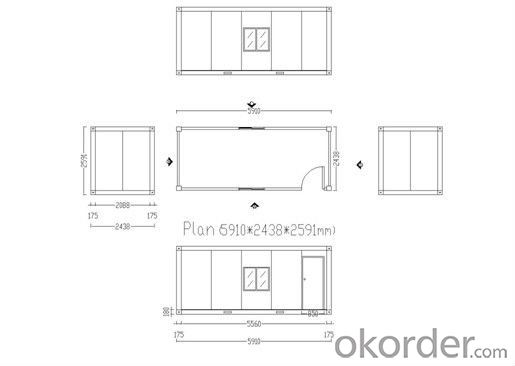
- Q: Can container houses be designed for agricultural or farming purposes?
- Yes, container houses can certainly be designed and adapted for agricultural or farming purposes. With proper modifications and additions, such as installing hydroponic systems, climate control systems, and vertical farming structures, container houses can be transformed into viable spaces for agricultural production. Additionally, container houses can be used as storage facilities for farm equipment, tools, and supplies, providing convenience and functionality to farmers.
- Q: Can container houses be designed with rainwater harvesting systems?
- Yes, container houses can definitely be designed with rainwater harvesting systems. These systems can be incorporated into the design of container houses by installing gutters and downspouts to collect rainwater, and using storage tanks and filtration systems to store and purify the water for various uses within the house.
- Q: Do container houses require special permits?
- Special permits are typically needed for container houses. The permits required can differ depending on the location and regulations imposed by the local government or building authorities. Container houses are often seen as non-traditional structures, so additional approvals or permits might be necessary to comply with building codes, zoning regulations, and safety standards. These permits can include evaluations of the structure's strength, electrical and plumbing systems, insulation, ventilation, and occupancy. To fully comprehend the permitting requirements for container houses in your area, it is crucial to consult with local authorities or seek professional guidance.
- Q: Are container houses suitable for temporary or permanent living?
- Container houses are suitable for both temporary and permanent living. They provide a cost-effective and sustainable housing solution, making them ideal for temporary accommodations like disaster relief shelters or construction site offices. Additionally, with proper insulation and interior design, container houses can offer comfort and functionality for long-term living, making them a viable option for permanent dwellings as well.
- Q: Are container houses resistant to wildfires or forest fires?
- There are several factors that determine whether container houses can resist wildfires or forest fires. The resistance of a container house greatly depends on the materials used for its construction. Shipping containers, typically made of non-combustible steel, are capable of withstanding high temperatures, making them less likely to catch fire or sustain severe damage from flames. Nevertheless, it is important to consider that container houses still require proper insulation and fire-resistant features to enhance their ability to withstand wildfires. These features may include fire-resistant coatings, fireproof insulation materials, as well as windows and doors that have been rated for fire resistance. Furthermore, the surrounding environment and vegetation can also impact the level of fire resistance. If a container house is situated in an area with a high risk of wildfires, it is advisable to take extra precautions, such as clearing vegetation around the house and creating a defensible space. In conclusion, while container houses have the potential to resist wildfires, it is crucial to ensure that appropriate fire-resistant measures are implemented during construction and to take necessary precautions based on the level of fire risk in the vicinity.
- Q: Are container houses legal in all areas?
- Container houses, also referred to as shipping container homes, have legal status in numerous regions. Nevertheless, the permissibility of these dwellings can differ depending on local building codes and regulations. In certain areas, container houses are entirely lawful and regarded as a legitimate form of housing. These regions typically have precise guidelines and prerequisites concerning safety, structure, and aesthetics that must be adhered to. On the flip side, there are regions where container houses may face restrictions or complete prohibitions. These limitations can be influenced by factors like zoning regulations, building codes, and neighborhood covenants. Some jurisdictions may lack well-defined regulations specifically tailored for container homes, making it challenging to ascertain their legality. It is imperative for individuals intrigued by container houses to conduct thorough research and comprehend the specific rules and regulations applicable to their area. This may entail seeking guidance from local building departments, planning commissions, or even seeking legal counsel to ensure full compliance with all relevant laws. Consequently, individuals will be able to determine whether container houses are permitted in their area and what prerequisites must be fulfilled to ensure their legality.
- Q: Can container houses be designed for small businesses or shops?
- Yes, container houses can be designed for small businesses or shops. In fact, container houses have gained popularity in recent years due to their versatility and cost-effectiveness. They can be easily converted into functional spaces for various purposes, including small businesses and shops. Container houses offer several advantages for small businesses and shops. Firstly, they are highly customizable, allowing for easy modifications to suit specific business needs. Containers can be fitted with windows, doors, and partitions to create separate areas for retail, storage, and office space. Additionally, they can be stacked or connected to form larger spaces, allowing for expansion as the business grows. Furthermore, container houses are relatively affordable compared to traditional brick-and-mortar structures. This cost-effectiveness is especially beneficial for small businesses and shops with limited budgets. Containers are readily available, and their modular nature reduces construction time and labor costs. Moreover, they can be transported and relocated, making them suitable for temporary or mobile businesses such as pop-up shops or food stalls. Container houses also offer sustainability benefits, which align with the increasing trend towards eco-friendly businesses. Containers are typically made from recycled materials, reducing the environmental impact of construction. Furthermore, they can be equipped with energy-efficient features like insulation, solar panels, and rainwater harvesting systems, minimizing energy consumption and promoting sustainability. In conclusion, container houses can indeed be designed and utilized for small businesses or shops. Their versatility, affordability, and sustainability make them an attractive option for entrepreneurs looking for flexible and cost-effective spaces to set up their businesses.
- Q: Can container houses be designed to have a small balcony or terrace?
- Yes, container houses can definitely be designed to have a small balcony or terrace. While the primary structure of a container house is typically made from shipping containers, the design possibilities are virtually limitless. With the right planning and modifications, container houses can incorporate balconies or terraces to extend the living space and provide outdoor areas. To create a small balcony or terrace in a container house, several design approaches can be taken. One option is to remove a section of the container wall and replace it with large sliding or folding glass doors that open onto a balcony. This allows for seamless indoor-outdoor living and increases the sense of space. Another approach is to utilize the roof of the container house as a terrace. By reinforcing the roof structure and adding safety features such as railings, a usable outdoor space can be created. This rooftop terrace can be accessed through an external staircase or even an internal staircase within the container house. It is important to consider the structural integrity and weight distribution when designing a balcony or terrace for a container house. Proper support systems, such as additional steel beams or columns, may need to be incorporated to ensure the safety and stability of the structure. Additionally, the choice of materials for the balcony or terrace should be carefully considered to withstand outdoor elements. Durable and weather-resistant materials like composite decking or concrete can be used to create a functional and visually appealing outdoor space. In conclusion, container houses can certainly be designed to include a small balcony or terrace. With thoughtful planning, structural modifications, and the right choice of materials, container houses can provide a comfortable and enjoyable outdoor living experience.
- Q: Are container houses safe during earthquakes?
- Container houses can be safe during earthquakes if they are properly designed and built to withstand seismic forces. The safety of container houses during earthquakes depends on various factors such as the structural integrity of the containers, the foundation they are placed on, and the overall construction techniques used. Container houses can be reinforced to make them more resistant to earthquakes. Additional steel reinforcements can be added to the containers' corners and walls to increase their structural strength. These reinforcements help distribute the seismic forces evenly throughout the structure, reducing the risk of collapse during an earthquake. Moreover, the foundation on which the container house is placed plays a crucial role in its earthquake safety. A strong and properly designed foundation can help absorb and dissipate seismic energy, minimizing the impact on the structure. It is essential to ensure the container house is securely anchored to the foundation to prevent it from sliding or toppling over during an earthquake. Additionally, the construction techniques used in building container houses should comply with local building codes and regulations. Adequate insulation, fireproofing, and proper electrical and plumbing installations are also essential for the safety and functionality of the house. It is important to note that no structure can be completely immune to the destructive forces of a severe earthquake. However, with proper design, construction, and adherence to safety standards, container houses can provide a safe and durable living space during seismic events. Consulting with structural engineers and following local guidelines can help ensure the safety of container houses in earthquake-prone areas.
- Q: Can container houses be insulated?
- Certainly! Container houses can indeed be insulated. Insulation plays a vital role in the construction of container houses. Due to their metallic composition, shipping containers have a tendency to transfer heat and cold, resulting in an uncomfortable interior temperature. Nevertheless, incorporating insulation into the walls, roof, and floor of a container house can significantly enhance its thermal performance. Multiple insulation options are at one's disposal, ranging from foam and fiberglass to natural materials like straw bales. Moreover, insulation aids in reducing energy consumption for heating or cooling, thus rendering container houses more energy-efficient and economically advantageous in the long term.
Send your message to us
Popular container house
- Loading Port:
- China Main Port
- Payment Terms:
- TT OR LC
- Min Order Qty:
- -
- Supply Capability:
- -
OKorder Service Pledge
OKorder Financial Service
Similar products
Hot products
Hot Searches
Related keywords
